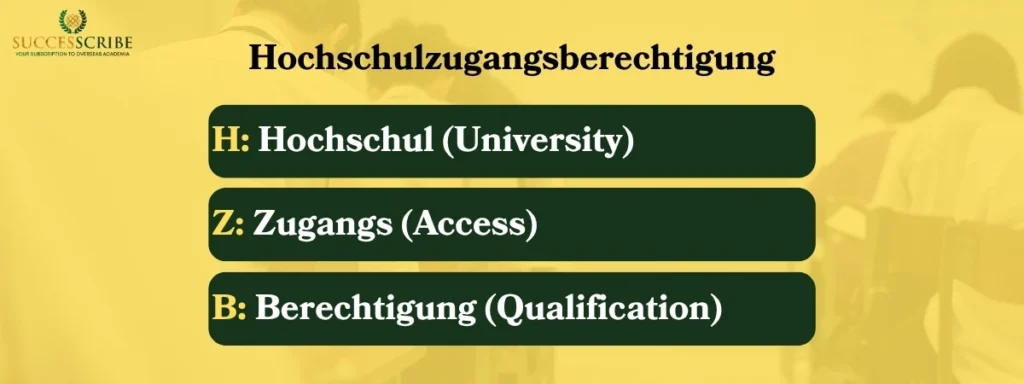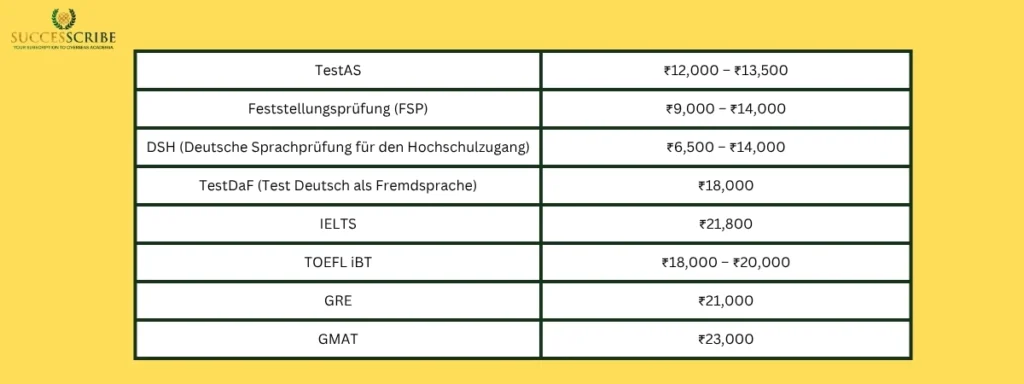Studying in Germany has become one of the most popular choices for international students, including Indians. Known for its world-class education, affordable tuition fees, and research opportunities, Germany attracts students from all over the world. However, gaining admission to German universities requires careful planning, particularly when it comes to the Germany University Entrance Exam. This topic will provide a comprehensive overview of entrance exams, eligibility criteria, application process, costs, and other essential details to help students achieve their dream of studying in Germany.
Key Facts about Studying in Germany
| Number of Universities | 422 (public and private) |
| Tuition Fees | Mostly free for public universities; €0–€3,000 per year in some cases |
| Popular Courses | Engineering, Computer Science, Business, Medicine |
| Language of Instruction | German & English (English-taught programs available) |
Understanding HZB Germany: The Foundation of University Admission

Obtaining HZB is essential for eligibility to sit for the Germany University Entrance Exam.
What is HZB in Germany?
HZB stands for Hochschulzugangsberechtigung, which translates to Higher Education Entrance Qualification. It is a certification that allows individuals to apply for undergraduate programs at universities in Germany. Essentially, HZB signifies that a student’s prior education meets the academic standards required for university admission in Germany.
HZB Full Form
- H: Hochschul (University)
- Z: Zugangs (Access)
- B: Berechtigung (Qualification)
Therefore, HZB is the official term for the university entrance qualification in Germany.
Types of HZB
There are several pathways through which students can obtain HZB:
- German Abitur: The standard university entrance qualification obtained after completing secondary education in Germany.
- Foreign Secondary School Certificates: International students can have their foreign school-leaving certificates evaluated to determine if they are equivalent to the German Abitur. This evaluation is typically done through the anabin database or by institutions like uni-assist.
- Studienkolleg + Feststellungsprüfung: If a student’s foreign qualification is not directly recognized, they may need to attend a Studienkolleg (a preparatory course) and pass the Feststellungsprüfung (assessment examination) to qualify for university admission.
- Professional Qualifications: In some cases, professional qualifications or vocational training can also lead to HZB, allowing individuals to pursue higher education in specific fields.
Importance of HZB
Having HZB is crucial for:
- University Admission: It is a prerequisite for applying to most undergraduate programs in Germany.
- Visa Applications: German embassies often require proof of HZB when processing student visa applications.
- Program Eligibility: Certain programs may have specific HZB requirements, determining the subjects or fields a student can pursue.
Verifying HZB
For international students, it’s essential to verify if their foreign qualifications are recognized as HZB in Germany. This can be done through:
- anabin Database: A comprehensive database that provides information on the recognition of foreign educational qualifications.
- uni-assist: An organization that evaluates foreign certificates and assists with university applications in Germany.
German University Entrance Qualification
The Germany University Entrance Exam verifies that students are academically ready to pursue their chosen programs in Germany. Without this, students cannot enroll in higher education programs.
- It ensures that students meet academic standards required by German universities.
- Students with foreign qualifications often need a recognition process by the Central Office for Foreign Education (ZAB).
- Students who do not meet the direct HZB requirements may attend a Studienkolleg (preparatory course) and pass the Feststellungsprüfung (assessment test).
Which Exam is Required for Germany?

The type of Germany University Entrance Exam depends on the program level, field of study, and the language of instruction. When planning to study in Germany, understanding the specific entrance exams required for your desired program is crucial. These exams assess your academic readiness and, in some cases, your language proficiency. The requirements vary based on the level of study (undergraduate or postgraduate), the field of study, and your country of origin.
Key Factors Determining Required Exams:
- Your home country’s education system
- The level of recognition of your school-leaving certificate
- Your chosen field of study
- Whether you’re applying for undergraduate or graduate programs
- The specific university’s admission requirements
Common Germany University Entrance Exam Types
Here are the main entrance examinations and assessments you might encounter:
1. Academic Entrance Exams
| Exam | Purpose | Who Needs It | Duration | Cost | Validity |
| TestAS | Assesses general academic aptitude for undergraduate programs | Non-EU international students | 4–5 hours | €75–€100 | 2 years |
| TMS (Test für Medizinische Studiengänge) | For admission to medicine, dentistry, or pharmacy | Students applying to medical fields | 5 hours | €80–€100 | 2 years |
| Studienkolleg + Feststellungsprüfung | Preparatory course + assessment for students whose qualifications are not equivalent to German Abitur | Students from non-recognized foreign schools | 1 year (course) + exam | €2,000–€4,000 (course fees vary) |
2. Language Proficiency Exams
German universities require proof of language proficiency in either German or English, depending on the program’s language of instruction.
German-Taught Programs
| Exam | Purpose | Sections | Minimum Requirement |
| DSH | University admission for German programs | Written + Oral | DSH-2 (CEFR C1) |
| TestDaF | Another recognized German language exam | Reading, Listening, Writing, Speaking | TDN 4 in all sections |
English-Taught Programs
| Exam | Score Requirement |
| IELTS | Minimum 6.5 (Academic) |
| TOEFL | Minimum 90 |
| PTE Academic | Minimum 59 |
Postgraduate Program Exams
Some Master’s or MBA programs require additional entrance exams:
| Exam | Purpose | Typical Programs | Score Requirement |
| GRE | Academic aptitude for Master’s programs | Engineering, Computer Science, Natural Sciences | 260–340 (competitive programs usually >310) |
| GMAT | Management and business programs | MBA and related fields | 200–800 (preferred >650) |
| Portfolio / Audition | Creative and performing arts | Arts, Design, Music | Varies by university |
Program-Specific Notes for Indian Students
Some German universities also accept scores from Indian exams:
| Exam | Purpose | Accepted Programs |
| JEE Advanced | Engineering aptitude | Selected undergraduate engineering programs |
| NEET | Medical programs | Occasionally accepted for medicine, dentistry, and pharmacy programs |
Eligibility Criteria for German University Entrance Exam
To study in Germany, students must meet certain eligibility criteria before applying for a university and its entrance exams. These criteria vary depending on the level of study, the type of program, and whether you are an EU or non-EU student.
1. Undergraduate Programs
For students planning to pursue a Bachelor’s degree in Germany, the main eligibility criteria are:
| Criteria | Details |
| HZB (Higher Education Entrance Qualification) | Students must have a recognized HZB certificate (German Abitur or equivalent foreign school-leaving certificate). If not recognized, a Studienkolleg + Feststellungsprüfung may be required. |
| Language Proficiency | German-taught programs: DSH or TestDaF.English-taught programs: IELTS, TOEFL, or PTE Academic. |
| Entrance Exams | Some programs may require TestAS or subject-specific exams. |
| Age Limit | No strict age limit, but most students apply between 17–25 years. |
| Minimum Grades | Usually 50–60% or equivalent in your high school certificate. Highly competitive programs like medicine or engineering may require higher grades. |
2. Postgraduate Programs
For Master’s programs, eligibility is slightly different:
| Criteria | Details |
| Bachelor’s Degree | A recognized Bachelor’s degree (or equivalent) in a related field. |
| Academic Performance | Minimum GPA required is usually 2.5–3.0 on German scale (equivalent to 60–70%). Top universities may have stricter GPA requirements. |
| Entrance Exams | Some programs require GRE, GMAT, or subject-specific entrance exams. |
| Language Proficiency | German-taught programs: DSH/TestDaF.English-taught programs: TOEFL/IELTS/PTE Academic. |
| Work Experience | For some management programs (MBA, EMBA), 1–3 years of work experience may be required. |
3. Program-Specific Requirements
Some programs in Germany have additional requirements:
| Field of Study | Additional Criteria |
| Medicine, Dentistry, Pharmacy | May require TMS or NEET scores. |
| Engineering & Technology | Some universities may accept JEE Advanced scores for Indian students. |
| Arts, Design, Music | Portfolio submission, auditions, or interviews may be required. |
| Business &General Requirements Management | GMAT scores and/or work experience for certain programs. |
4. General Requirements
- Passport & Visa: A valid passport is mandatory for international students. A student visa is required before traveling to Germany.
- Financial Proof: Most universities and embassies require proof of funds to cover living expenses (€11,208 per year for 2025).
- Health Insurance: Mandatory for all students in Germany.
Cost of Germany University Entrance Exams for International Students (Especially from India)

Germany is known for offering world-class education at minimal costs, and the same principle applies to its university entrance exams. Most public universities in Germany either don’t charge any separate entrance exam fees or keep them highly affordable for international students. However, depending on your study level (Bachelor’s or Master’s) and the type of exam (aptitude, language, or subject-based), the cost can vary.
| Exam Name | Purpose / Requirement | Approx. Fee (in EUR) | Approx. Fee (in INR) | Remarks / Validity |
| TestAS | Required for undergraduate admission (aptitude test for international students) | €130 – €145 | ₹12,000 – ₹13,500 | Valid for multiple universities; test taken twice a year |
| Feststellungsprüfung (FSP) | Final exam after Studienkolleg to qualify for German universities | €100 – €150 | ₹9,000 – ₹14,000 | Paid to the Studienkolleg; one-time cost |
| DSH (Deutsche Sprachprüfung für den Hochschulzugang) | German language proficiency test | €70 – €150 | ₹6,500 – ₹14,000 | Accepted by all German universities |
| TestDaF (Test Deutsch als Fremdsprache) | German proficiency for university admission | €195 | ₹18,000 | Conducted globally; valid for 2 years |
| IELTS | English language proficiency (for English-taught programs) | €235 | ₹21,800 | Valid for 2 years |
| TOEFL iBT | English proficiency (alternative to IELTS) | €195 – €215 | ₹18,000 – ₹20,000 | Widely accepted internationally |
| GRE | For Master’s programs (mainly in STEM/technical fields) | €228 | ₹21,000 | Valid for 5 years |
| GMAT | For MBA or Management programs | €250 | ₹23,000 | Valid for 5 years |
Additional Costs to Consider
Apart from exam fees, international students (especially from India) should plan for these related expenses:
| Expense Type | Average Cost (in EUR) | Average Cost (in INR) | Description |
| Application fee via uni-assist | €75 for first application + €30 for each additional | ₹6,900 + ₹2,700 | Mandatory for most public universities |
| Courier / Document Authentication | €20 – €50 | ₹1,800 – ₹4,500 | Sending verified documents to universities |
| Language Course (optional) | €200 – €800 per level | ₹18,000 – ₹74,000 | If preparing for DSH or TestDaF |
| Travel to Test Centers | €20 – €100 | ₹1,800 – ₹9,200 | Depends on test location |
Exam Dates & Deadlines for Germany University Entrance Exams

When planning to study in Germany, keeping track of entrance exam dates and deadlines is one of the most important parts of the admission process. Each exam – whether it’s for academic aptitude or language proficiency – has its own schedule, registration window, and result release timeline. Understanding these timelines early helps you avoid last-minute stress and ensures a smooth university application process. Planning ahead is essential to align with the registration and result dates of the Germany University Entrance Exam.
General Timeline Overview
Most German university entrance exams are conducted several times a year, allowing international students to choose a session that aligns best with their application period. Below is a general timeline that most exams follow:
| Stage | Typical Period | What Happens |
| Registration Opens | 3–6 months before the exam date | Students register online and pay the exam fee. |
| Exam Dates | Conducted 2–4 times a year (varies by exam) | Exams are held both in Germany and at approved international centers. |
| Result Announcement | Usually 3–6 weeks after the test | Results are released online through official portals. |
| University Application Deadlines | Summer Intake: December–MarchWinter Intake: May–July | Students must ensure exam results are available before university deadlines. |
TestAS (Test for Academic Studies)
The TestAS exam for undergraduate admissions is generally offered multiple times a year in both digital and paper-based formats.
- Registration opens several months before the exam.
- Students should register early, as test centers in India and other countries have limited slots.
- Results are usually available online within 4–5 weeks after the test.
Tip: Always plan your TestAS attempt at least one semester before your intended intake to ensure timely submission of results.
TestDaF (German Language Proficiency Test)
The TestDaF exam is one of the most widely accepted German language tests for university admission.
- Conducted multiple times each year in both digital and paper formats.
- Each exam session has its own registration and result release dates.
- The results are typically available within a few weeks, and the certificate remains valid indefinitely.
Important: TestDaF is recognized by all German universities for programs taught in German, so schedule your test early enough to meet admission deadlines.
DSH (Deutsche Sprachprüfung für den Hochschulzugang)
Unlike TestDaF, the DSH exam is conducted by individual universities rather than a central body.
- Exam dates vary depending on the university’s internal calendar.
- Typically held a few weeks before the start of each academic semester.
- Students must register directly through the university’s Sprachenzentrum (Language Center).
Pro Tip: If you’re applying to multiple universities, check each institution’s DSH schedule carefully, as they differ significantly.
Other Exams (GRE, GMAT, TMS, IELTS, TOEFL)
- GRE/GMAT: Available year-round and can be scheduled at authorized centers worldwide. Ideal for Master’s and MBA aspirants.
- TMS (Test für Medizinische Studiengänge): Conducted once or twice a year; mandatory for admission into medical and dentistry programs in Germany.
- IELTS/TOEFL/PTE: Offered multiple times a month across test centers globally. These exams are essential for English-taught programs.
| Exam | Frequency | Registration Window | Result Availability | Validity |
| TestAS | 2–3 times a year | 3–5 months before test | 4–5 weeks after test | 2 years |
| TestDaF | 5–6 times a year | 4–6 weeks before test | 3–4 weeks after test | Lifetime |
| DSH | Depends on university | 1–2 months before semester | 2–4 weeks after exam | Lifetime |
| GRE/GMAT | Year-round | Ongoing | 10–15 days after test | 5 years |
| IELTS/TOEFL | Multiple times per month | Anytime | 5–10 days after test | 2 years |
| TMS | Once or twice a year | 3–4 months before test | 4 weeks after test | 2 years |
Conclusion
The Germany University Entrance Exam plays a vital role in shaping the academic journey of every international student aspiring to study in one of the world’s most advanced education systems. Whether it’s obtaining your HZB (Hochschulzugangsberechtigung), proving your skills through TestAS, or demonstrating language proficiency via TestDaF, DSH, or English tests like IELTS and TOEFL, each step ensures that students are academically and linguistically ready for German universities’ rigorous standards.
FAQs
What is HZB in Germany and why is it important for admission?
HZB (Hochschulzugangsberechtigung) is the German University Entrance Qualification. It confirms that your previous education meets the standards required for studying at German universities. Without HZB, international students cannot apply for undergraduate programs in Germany. Indian students often need either a recognized school-leaving certificate or must complete Studienkolleg + Feststellungsprüfung to obtain HZB.
Which exam is required for admission to German universities?
The required exam depends on your program and language of instruction:
1. Undergraduate programs: TestAS (aptitude) for international students.
2. German-taught programs: DSH or TestDaF (language proficiency).
3. English-taught programs: IELTS, TOEFL, or PTE Academic.
4. Medical programs: TMS or NEET (sometimes required).
5. Master’s programs: GRE or GMAT may be needed depending on the field.
Can I study in Germany without HZB?
Direct admission without HZB is generally not possible. However, students whose foreign qualifications are not equivalent to HZB can enroll in a Studienkolleg (preparatory course) and pass the Feststellungsprüfung, after which they become eligible for German university admission.
What subjects are covered in the TestAS exam?
TestAS evaluates general academic aptitude, focusing on:
1. Mathematical skills and logical reasoning
2. Reading comprehension and text understanding
3. Quantitative problem-solving
Some subject-specific modules exist for natural sciences, engineering, and economics tracks.
Can I bypass the entrance exam for German universities?
Yes, in certain cases, you can legally bypass entrance exams:
1. If your certificate is recognized as HZB (e.g., IB, A-Levels).
2. Through university waivers or English-taught programs (only IELTS/TOEFL needed).
3. By completing Studienkolleg + Feststellungsprüfung for non-equivalent certificates.
4. Occasionally via professional qualifications or alternative aptitude tests for mature students.
Related Post
Entrance exam for masters in Germany
RWTH Aachen language requirements
Heidelberg University language requirements
TOEFL accepting universities in Germany















